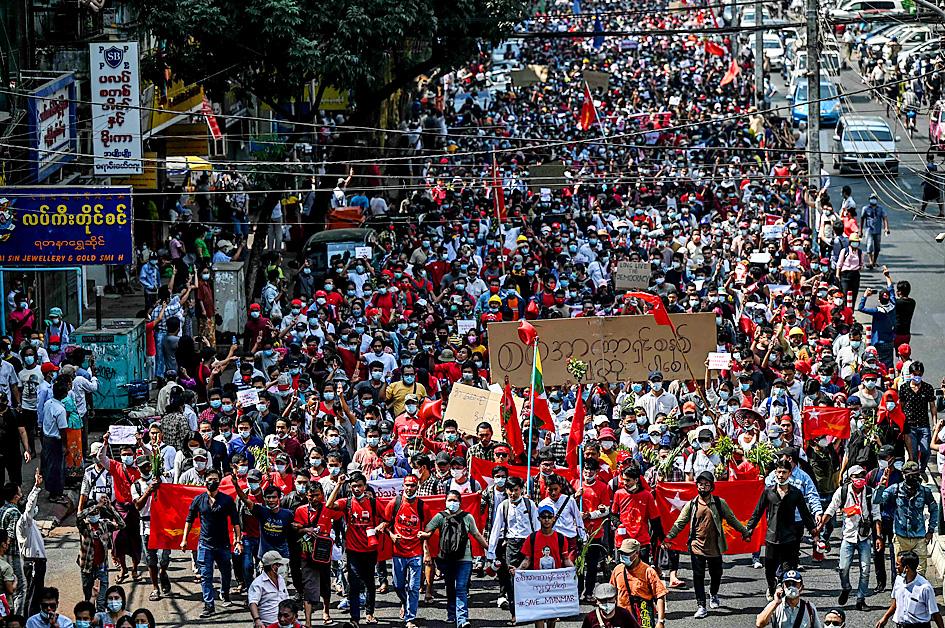Tens of thousands of protesters yesterday poured on to the streets of Yangon in the biggest rally yet against the Myanmar coup, as an Internet blackout failed to stifle growing outrage at the military’s ouster of Burmese state counsellor Aung San Suu Kyi.
Some estimates put the number of protesters in Yangon at 100,000, and there were reports of large demonstrations in other cities, with rallies condemning the coup that brought Myanmar’s 10-year experiment with democracy to a crashing halt.
Backed by a din of vehicle horns, chanting protesters in Yangon held up banners reading: “Justice for Myanmar,” while others waved the signature red flags of Aung San Suu Kyi’s National League for Democracy (NLD) party as they marched to the city hall.

Photo: AFP
“I completely despise the military coup, and I am not afraid of a crackdown,” said Kyi Phyu Kyaw, a 20-year-old university student. “I will join every day until Amay Suu [Mother Suu] is freed.”
Protesters announced that they would return to the streets at 10am today, defying the state of emergency imposed by the military and indicating no let-up in their resistance to the coup.
They also called on civil servants and people employed in other industries to not go to work and join the protests.
“We will fight until the end,” said Ye Kyaw, an 18-year-old economics student. “The next generation can have democracy if we end this military dictatorship.”
There was also a large demonstration in the capital, Naypyidaw, despite the heavy military presence there, while tens of thousands rallied against the coup in Mandalay, Myanmar’s second-biggest city.
Both of those protests included people on armadas of motorcycles, waving flags and banners as they rode through the cities.
There were also demonstrations in Mawlamyine city and the Magway region.
The surge in popular dissent over the weekend overcame a nationwide Internet blockade.
Monitoring service NetBlocks said that Internet access was partially restored on some mobile networks in Myanmar yesterday afternoon, but social media platforms remained blocked, and it was unclear how long the connectivity would last.

NATIONAL SECURITY THREAT: An official said that Guan Guan’s comments had gone beyond the threshold of free speech, as she advocated for the destruction of the ROC China-born media influencer Guan Guan’s (關關) residency permit has been revoked for repeatedly posting pro-China content that threatens national security, the National Immigration Agency said yesterday. Guan Guan has said many controversial things in her videos posted to Douyin (抖音), including “the red flag will soon be painted all over Taiwan” and “Taiwan is an inseparable part of China,” while expressing hope for expedited “reunification.” The agency received multiple reports alleging that Guan Guan had advocated for armed reunification last year. After investigating, the agency last month issued a notice requiring her to appear and account for her actions. Guan Guan appeared as required,

A Vietnamese migrant worker yesterday won NT$12 million (US$379,627) on a Lunar New Year scratch card in Kaohsiung as part of Taiwan Lottery Co’s (台灣彩券) “NT$12 Million Grand Fortune” (1200萬大吉利) game. The man was the first top-prize winner of the new game launched on Jan. 6 to mark the Lunar New Year. Three Vietnamese migrant workers visited a Taiwan Lottery shop on Xinyue Street in Kaohsiung’s Gangshan District (崗山), a store representative said. The player bought multiple tickets and, after winning nothing, held the final lottery ticket in one hand and rubbed the store’s statue of the Maitreya Buddha’s belly with the other,

‘NATO-PLUS’: ‘Our strategic partners in the Indo-Pacific are facing increasing aggression by the Chinese Communist Party,’ US Representative Rob Wittman said The US House of Representatives on Monday released its version of the Consolidated Appropriations Act, which includes US$1.15 billion to support security cooperation with Taiwan. The omnibus act, covering US$1.2 trillion of spending, allocates US$1 billion for the Taiwan Security Cooperation Initiative, as well as US$150 million for the replacement of defense articles and reimbursement of defense services provided to Taiwan. The fund allocations were based on the US National Defense Authorization Act for fiscal 2026 that was passed by the US Congress last month and authorized up to US$1 billion to the US Defense Security Cooperation Agency in support of the

CLASSIFIED BRIEFING: The ministry said the special budget focuses on building a comprehensive defense system and strengthening the domestic defense industry The Ministry of National Defense yesterday released information on seven categories of weapons systems to be procured under a stalled NT$1.25 trillion (US$39.57 billion) special defense budget, including precision artillery, long-range missiles, air defense anti-tank missiles and more than 200,000 uncrewed aerial vehicles (UAVs). The Executive Yuan approved a draft version of the budget on Nov. 27 last year and submitted it to the legislature for review. The legislature’s Foreign Affairs and National Defense Committee yesterday invited Minister of National Defense Wellington Koo (顧立雄) to deliver a classified briefing and answer questions at a closed-door session. Koo said he hoped to provide lawmakers